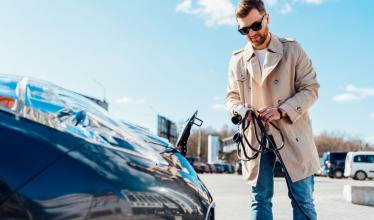It’s been a busy week in terms of electric car news, with some significant announcements made over the past five days.
Of those that made headlines within the EV world, those that caught the wider public imagination most were certainly announcements from Volvo and the French government.
Volvo’s news was that all new cars launched from 2019 onward would be electrified. This includes mild hybrid systems unveiled in the press release, plus presumably conventional hybrids too. Volvo has previously revealed plans to offer PHEV versions of every model on sale as it refreshes its model line-up.
Often overlooked in the news though was that five new pure EVs will arrive between 2019 and 2021, which would instantly put the Swedish firm amongst the major EV manufacturers by the beginning of 2022.
The Volvo news is important in the fact that it also follows two other recent announcements. Firstly, Volvo will develop no new diesel engines, meaning that come 2022-25, there will be no diesel-powered cars available once the current unit’s development cycle ends.
Also, Volvo is setting up its in-house tuning firm Polestar to have both a greater role in the company, and also to be focused purely on electrified models. The combination of the three announcements puts Volvo right at the forefront of EV development in the next five years.
The news from Sweden was fortuitous in the sense that it will set Volvo up nicely for the French car market from 2040. The country’s new Environment Minister revealed that France will ban the sale of internal combustion engined cars by that date.
It is not yet clear whether 2040 represents a pure-EV only watershed, or simply if non-electrified models, but either way, it a clear boost for the plug-in car market.
France isn’t the only country to propose electric car sales plans, with the likes of the Netherlands, Norway, and India all announcing or considering similar proposals. The UK has expectations that the vast majority of cars and vans sold by 2040 will be zero-emission too.
However, France’s ban is by far the most significant and concrete of any previous plans, and is a major car producing country too with the likes of Renault, Citroen, Peugeot, and DS Automobiles all based there.
It’s not just in the national newspaper headlines where significant plug-in car news has been announced though. Hyundai has put its Ioniq Plug-in Hybrid on sale in the UK.
The third of the electrified Ioniq range is now available after the Electric and Hybrid came along last year. With an official electric range of 39 miles, the Ioniq Plug-in Hybrid is available to buy from Thursday 13th July, with prices starting at £24,995.
Also announced is the news that Riversimple is looking for 100 test drivers in Monmouthshire, to provide feedback on its hydrogen fuel cell Rasa.
It’s the first time such a development project has been used for what will become a publicly available model, and there will be a specially installed hydrogen refueling station available for test drivers to use.
Last but not least, the latest plug-in car sales figures came out on Wednesday this week, showing a blossoming electric vehicle market against a backdrop of overall sales decline.
With diesel sales falling because of concerns over emissions and air quality issues, alternatively fueled cars have benefited, with strong performance from EVs and PHEVs in particular.
June saw the plug-in car market take 1.8% if overall sales – equaling the previous market share record – with pure-EVs up more than 45% compared to last year, and PHEVs up more than a third.
Find EV charge points and hydrogen refueling stations by using the filters on the Zap-Map desktop and app maps.



